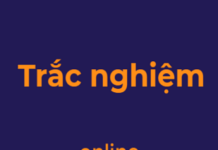- Trắc Nghiệm Bài 18 Lũy Thừa Với Mũ Số Thực Mức Thông Hiểu Giải Chi Tiết
- 50 Câu Trắc Nghiệm Rút Gọn Biểu Thức Lôgarit Giải Chi Tiết
- Trắc Nghiệm Tính Biểu Thức Lôgarit Thỏa Điều Kiện Cho Trước Giải Chi Tiết
- Trắc Nghiệm Tính Biểu Thức Lôgarit Theo a, b, c Có Lời Giải Chi Tiết
- Trắc Nghiệm Vận Dụng Cao Biến Đổi Lôgarit Và Tính Biểu Thức Giải Chi Tiết
- Trắc Nghiệm Bài 20 Hàm Số Mũ Và Hàm Số Lôgarit Giải Chi Tiết
- 50 Câu Trắc Nghiệm Phương Trình Mũ Theo Dạng Giải Chi Tiết
- 40 Câu Trắc Nghiệm Phương Trình Lôgarit Theo Dạng Giải Chi Tiết
- 35 Câu Trắc Nghiệm Bất Phương Trình Mũ Theo Dạng Giải Chi Tiết
- 50 Câu Trắc Nghiệm Bất Phương Trình Lôgarit Theo Dạng Giải Chi Tiết
- 70 Câu Trắc Nghiệm Lãi Suất Theo Từng Dạng Giải Chi Tiết
- Các Dạng Toán Bài Lũy Thừa Với Mũ Số Thực Giải Chi Tiết
- 50 Câu Trắc Nghiệm Lũy Thừa Với Mũ Số Thực Theo Mức Độ Giải Chi Tiết
- Các Dạng Toán Bài Lôgarit Có Lời Giải Chi Tiết
- 60 Câu Trắc Nghiệm Bài Lôgarit Mức Thông Hiểu Giải Chi Tiết
- 70 Câu Trắc Nghiệm Bài Lôgarit Mức Vận Dụng Giải Chi Tiết
- Các Dạng Toán Bài Hàm Số Mũ Và Hàm Số Lôgarit Giải Chi Tiết
- 40 Câu Trắc Nghiệm Bài Hàm Số Mũ Và Hàm Số Lôgarit Mức Thông Hiểu
- 50 Câu Trắc Nghiệm Hàm Số Mũ Và Hàm Số Lôgarit Mức Vận Dụng
- Các Dạng Toán Bài Phương Trình Bất Phương Trình Mũ Và Lôgarit Giải Chi Tiết
- 60 Câu Trắc Nghiệm Phương Trình Mũ Mức Thông Hiểu Giải Chi Tiết
- 50 Câu Trắc Nghiệm Phương Trình Lôgarit Mức Thông Hiểu Giải Chi Tiết
35 câu trắc nghiệm bất phương trình mũ theo dạng giải chi tiết được soạn dưới dạng file word và PDF gồm 3 trang. Các bạn xem và tải về ở dưới.
Phương pháp
Đưa về cùng cơ số hoặc Logarit hóa: Biến đổi đưa về phương trình mũ dạng: ${a^{f\left( x \right)}} > {a^{g\left( x \right)}}$ hoặc ${a^{f\left( x \right)}} \geqslant {a^{g\left( x \right)}}$ rồi áp dụng bất phương trình mũ cơ bản.
• Nếu $a > 1$ thì ${a^{f\left( x \right)}} > {a^{g\left( x \right)}} \Leftrightarrow f\left( x \right) > g\left( x \right).\,$ (cùng chiều)
• Nếu $0 < a < 1$ thì ${a^{f\left( x \right)}} > {a^{g\left( x \right)}} \Leftrightarrow f\left( x \right) < g\left( x \right)$. $\,$ (ngược chiều)
• Nếu a chứa ẩn thì ${a^{f\left( x \right)}} > {a^{g\left( x \right)}} \Leftrightarrow \left( {a – 1} \right)\left[ {f\left( x \right) – g\left( x \right)} \right] > 0$.
Câu 1. Tập nghiệm của bất phương trình ${2^x} > 6$ là
A. $\left( {lo{g_2}6; + \infty } \right)$.
B. $\left( { – \infty ;3} \right)$.
C. $\left( {3; + \infty } \right)$.
D. $\left( { – \infty ;lo{g_2}6} \right)$.
Lời giải
Chọn A.
Ta có ${2^x} > 6 \Leftrightarrow x > lo{g_2}6$.
Câu 2. Tập nghiệm của bất phương trình ${3^x} < 2$ là
A. $\left( { – \infty ;lo{g_3}2} \right)$.
B. $\left( {lo{g_3}2; + \infty } \right)$.
C. $\left( { – \infty ;lo{g_2}3} \right)$.
D. $\left( {lo{g_2}3; + \infty } \right)$.
Lời giải
Chon A.
Ta có ${3^x} < 2 \Leftrightarrow x < lo{g_3}2$
Vậy $S = \left( { – \infty ;lo{g_3}2} \right)$.
Câu 3. Tập nghiệm của bất phương trình ${2^{2x}} < {2^{x + 6}}$ là:
A. $\left( { – \infty ;6} \right)$
B. $\left( {0;64} \right)$
C. $\left( {6; + \infty } \right)$
D. $\left( {0;6} \right)$
Lời giải
Chọn A.
Cách 1: ${2^{2x}} < {2^{x + 6}} \Leftrightarrow 2x < x + 6 \Leftrightarrow x < 6$
Cách 2:
Đặt $t = {2^x},t > 0$
Bất phương trình trở thành: ${t^2} – 64t < 0 \Leftrightarrow 0 < t < 64 \Leftrightarrow 0 < {2^x} < 64 \Leftrightarrow x < 6$.
Câu 4. Tìm tập nghiệm $S$ của bất phương trình ${5^{x + 1}} – \frac{1}{5} > 0$.
A. $S = \left( { – \infty ; – 2} \right)$.
B. $S = \left( {1; + \infty } \right)$.
C. $S = \left( { – 1; + \infty } \right)$.
D. $S = \left( { – 2; + \infty } \right)$.
Lời giải
Chọn D.
Bất phương trình tương đương ${5^{x + 1}} > {5^{ – 1}} \Leftrightarrow x + 1 > – 1 \Leftrightarrow x > – 2$.
Vậy tập nghiệm của bất phương trình là $S = \left( { – 2; + \infty } \right)$.
Câu 5. Tập nghiệm của bất phương trình ${\left( {\frac{1}{3}} \right)^x} > 9$ trên tập số thực là
A. $\left( {2; + \infty } \right)$.
B. $\left( { – \infty ; – 2} \right)$.
C. $\left( { – \infty ;2} \right)$.
D. $\left( { – 2; + \infty } \right)$.
Lời giải
Chọn B.
${\left( {\frac{1}{3}} \right)^x} > 9 \Leftrightarrow {3^{ – x}} > {3^2} \Leftrightarrow – x > 2 \Leftrightarrow x < – 2$.
Vậy tập nghiệm là: $S = \left( { – \infty ; – 2} \right)$.
Câu 6. Tập nghiệm $S$ của bất phương trình ${5^{x + 2}} < {\left( {\frac{1}{{25}}} \right)^{ – x}}$ là
A. $S = \left( { – \infty ;2} \right)$
B. $S = \left( { – \infty ;1} \right)$
C. $S = \left( {1; + \infty } \right)$
D. $S = \left( {2; + \infty } \right)$
Lời giải
Chọn D.
${5^{x + 2}} < {\left( {\frac{1}{{25}}} \right)^{ – x}} \Leftrightarrow {5^{x + 2}} < {5^{2x}} \Leftrightarrow x + 2\left\langle {2x \Leftrightarrow x} \right\rangle 2$
Câu 7. Tìm nghiệm của bất phương trình ${\left( {\frac{1}{2}} \right)^{x – 1}} \geqslant \frac{1}{4}$.
A. $x \leqslant 3$.
B. $x > 3$.
C. $x \geqslant 3$.
D. $1 < x \leqslant 3$.
Lời giải
Chọn A.
${\left( {\frac{1}{2}} \right)^{x – 1}} \geqslant \frac{1}{4} \Leftrightarrow {\left( {\frac{1}{2}} \right)^{x – 1}} \geqslant {\left( {\frac{1}{2}} \right)^2} \Leftrightarrow x – 1 \leqslant 2 \Leftrightarrow x \leqslant 3$
Câu 8. Tập nghiệm của bất phương trình ${\left( {\frac{e}{\pi }} \right)^x} > 1$ là
A. $\mathbb{R}$
B. $\left( { – \infty ;0} \right)$
C. $\left( {0; + \infty } \right)$
D. $\left[ {0; + \infty } \right)$
Lời giải
Chọn B.
Vì $\frac{e}{\pi } < 1$ nên ${\left( {\frac{e}{\pi }} \right)^x} > 1 \Leftrightarrow lo{g_{\frac{e}{\pi }}}{\left( {\frac{e}{\pi }} \right)^x} < lo{g_{\frac{e}{\pi }}}1 \Leftrightarrow x < 0$.
Vậy tập nghiệm của bất phương trình là $S = \left( { – \infty ;0} \right)$.
Câu 9. Tập nghiệm $S$ của bất phương trình ${3^x} < {e^x}$ là:
A. $S = \mathbb{R} \setminus \left\{ 0 \right\}$.
B. $S = \left( {0; + \infty } \right)$.
C. $S = \mathbb{R}$.
D. $S = \left( { – \infty ;0} \right)$.
Lời giải
Chọn D.
${3^x} < {e^x} \Leftrightarrow {\left( {\frac{3}{e}} \right)^x} < 1 \Leftrightarrow x < 0$. Tập nghiệm của bất phương trình là $S = \left( { – \infty ;0} \right)$.
Câu 10. Tập nghiệm của bất phương trình ${\left( {\frac{2}{3}} \right)^{2x + 1}} > 1$ là
A. $\left( { – \infty ;0} \right)$.
B. $\left( {0; + \infty } \right)$.
C. $\left( { – \infty ; – \frac{1}{2}} \right)$.
D. $\left( { – \frac{1}{2}; + \infty } \right)$.
Lời giải
Chọn C.
Ta có ${\left( {\frac{2}{3}} \right)^{2x + 1}} > 1 \Leftrightarrow 2x + 1 < 0 \Leftrightarrow x < – \frac{1}{2}$.
Vây: Tập nghiệm của bất phương trình là $\left( { – \infty ; – \frac{1}{2}} \right)$.
Câu 11. Tập nghiệm của bất phương trình ${2^{\sqrt x }} < 2$ là
A. $\left[ {0;1} \right)$.
B. $\left( { – \infty ;1} \right)$.
C. $\mathbb{R}$.
D. $\left( {1; + \infty } \right)$.
Lời giải
Chọn A.
${2^{\sqrt x }} < 2 \Leftrightarrow \left\{ {\begin{array}{*{20}{l}}
{x \geqslant 0} \\
{\sqrt x < 1}
\end{array} \Leftrightarrow \left\{ {\begin{array}{*{20}{l}}
{x \geqslant 0} \\
{x < 1}
\end{array} \Leftrightarrow x \in \left[ {0;1} \right)} \right.} \right.$
Câu 12. Bất phương trình ${\left( {\frac{\pi }{2}} \right)^{x – 1}} \leqslant {\left( {\frac{\pi }{2}} \right)^{2x + 3}}$ có nghiệm là
A. $x \leqslant – 4$.
B. $x > – 4$.
C. $x < – 4$.
D. $x \geqslant – 4$.
Lời giải
Chọn D.
Ta có:
${\left( {\frac{\pi }{2}} \right)^{x – 1}} \leqslant {\left( {\frac{\pi }{2}} \right)^{2x + 3}}$$ \Leftrightarrow x – 1 \leqslant 2x + 3$$ \Leftrightarrow x \geqslant – 4$
Câu 13. Tập nghiệm của bất phương trình ${\left( {\frac{1}{{\sqrt 3 }}} \right)^{\frac{1}{x}}} \leqslant {\left( {\frac{1}{{\sqrt 3 }}} \right)^2}$ là:
A. $\left( {0;\frac{1}{2}} \right)$.
B. $\left[ {\frac{1}{2}; + \infty } \right)$.
C. $\left( {0;\frac{1}{2}} \right]$.
D. $\left( { – \infty ;\frac{1}{2}} \right)$.
Lời giải
Chọn C.
Cơ số $a = \frac{1}{{\sqrt 3 }} < 1$ nên bất phương trình: ${\left( {\frac{1}{{\sqrt 3 }}} \right)^{\frac{1}{x}}} \leqslant {\left( {\frac{1}{{\sqrt 3 }}} \right)^2} \Leftrightarrow \frac{1}{x} \geqslant 2 \Leftrightarrow \frac{{1 – 2x}}{x} \geqslant 0 \Leftrightarrow 0 < x \leqslant \frac{1}{2}$.
Câu 14. Số nghiệm nguyên của bất phương trình ${2^{{x^2} + 3x}} \leqslant 16$ là số nào sau đây ?
A. 5 .
B. 6 .
C. 4 .
D. 3 .
Lời giải
Chọn B.
${2^{{x^2} + 3x}} \leqslant 16 \Leftrightarrow {2^{{x^2} + 3x}} \leqslant {2^4} \Leftrightarrow {x^2} + 3x \leqslant 4 \Leftrightarrow x \in \left[ { – 4;1} \right]$.
Các nghiệm nguyên của bất phương trình là : -4;-3;-2;-1;0;1.
Câu 15. Tập nghiệm của bất phương trình ${3^{{x^2} – 2x}} < 27$ là
A. $\left( {3; + \infty } \right)$
B. $\left( { – 1;3} \right)$
C. $\left( { – \infty ; – 1} \right) \cup \left( {3; + \infty } \right)$
D. $\left( { – \infty ; – 1} \right)$
Lời giải
Chọn B.
Ta có ${3^{{x^2} – 2x}} < 27 \Leftrightarrow {x^2} – 2x < 3 \Leftrightarrow {x^2} – 2x – 3 < 0 \Leftrightarrow – 1 < x < 3$.
Câu 16. Số nghiệm nguyên của bất phương trình ${\left( {\frac{1}{3}} \right)^{2{x^2} – 3x – 7}} > {3^{2x – 21}}$ là
A. 7 .
B. 6 .
C. vô số.
D. 8 .
Lời giải
Chọn A.
Ta có ${\left( {\frac{1}{3}} \right)^{2{x^2} – 3x – 7}} > {3^{2x – 21}} \Leftrightarrow {3^{ – \left( {2{x^2} – 3x – 7} \right)}} > {3^{2x – 21}}$
$ \Leftrightarrow – \left( {2{x^2} – 3x – 7} \right) > 2x – 21 \Leftrightarrow – 2{x^2} + 3x + 7 > 2x – 21$
$ \Leftrightarrow – 2{x^2} + x + 28 > 0 \Leftrightarrow – \frac{7}{2} < x < 4$
Do $x \in \mathbb{Z}$ nên $x \in \left\{ { – 3; – 2; – 1;0;1;2;3} \right\}$.
Vậy bất phương trình đã cho có 7 nghiệm nguyên.
Câu 17. Tập nghiệm của bất phương trình ${\left( {\frac{3}{4}} \right)^{ – {x^2}}} > \frac{{81}}{{256}}$ là
A. $\left( { – \infty ; – 2} \right)$.
B. $\left( { – \infty ; – 2} \right) \cup \left( {2; + \infty } \right)$.
C. $\mathbb{R}$.
D. $\left( { – 2;2} \right)$.
Lời giải
Chọn C.
Ta có: ${\left( {\frac{3}{4}} \right)^{ – {x^2}}} > \frac{{81}}{{256}} \Leftrightarrow {\left( {\frac{3}{4}} \right)^{ – {x^2}}} > {\left( {\frac{3}{4}} \right)^4} \Leftrightarrow – {x^2} < 4 \Leftrightarrow – {x^2} – 4 < 0 \Leftrightarrow x \in R$
Câu 18. Bất phương trình ${\left( {\frac{1}{2}} \right)^{{x^2} – 2x}} \geqslant \frac{1}{8}$ có tập nghiệm là
A. $\left[ {3; + \infty } \right)$.
B. $\left( { – \infty ; – 1} \right]$.
C. $\left[ { – 1;3} \right]$.
D. $\left( { – 1;3} \right)$.
Lời giải
Chọn C.
Bất phương trình đã cho tương đương với
${\left( {\frac{1}{2}} \right)^{{x^2} – 2x}} \geqslant {\left( {\frac{1}{2}} \right)^3} \Leftrightarrow {x^2} – 2x \leqslant 3 \Leftrightarrow {x^2} – 2x – 3 \leqslant 0 \Leftrightarrow – 1 \leqslant x \leqslant 3$
Vậy, tập nghiệm của bất phương trình đã cho là: $S = \left[ { – 1;3} \right]$.
Câu 19. Tập nghiệm $S$ của bất phương trình ${\left( {\frac{1}{2}} \right)^{{x^2} – 4x}} < 8$ là
A. $S = \left( { – \infty ;3} \right)$.
B. $S = \left( {1; + \infty } \right)$.
C. $S = \left( { – \infty ;1} \right) \cup \left( {3; + \infty } \right)$.
D. $S = \left( {1;3} \right)$.
Lời giải
Chọn C.
Bất phương trình ${\left( {\frac{1}{2}} \right)^{{x^2} – 4x}} < 8 \Leftrightarrow {\left( {\frac{1}{2}} \right)^{{x^2} – 4x}} < {2^3} \Leftrightarrow {\left( {\frac{1}{2}} \right)^{{x^2} – 4x}} < {\left( {\frac{1}{2}} \right)^{ – 3}}$
$ \Leftrightarrow {x^2} – 4x > – 3 \Leftrightarrow {x^2} – 4x + 3 > 0 \Leftrightarrow \left[ {\begin{array}{*{20}{l}}
{x > 3} \\
{x < 1}
\end{array}} \right.$
Nên tập nghiệm của bất phương trình ${\left( {\frac{1}{2}} \right)^{{x^2} – 4x}} < 8$ là $S = \left( { – \infty ;1} \right) \cup \left( {3; + \infty } \right)$.
Câu 20. Tìm tập nghiệm $S$ của bất phương trình ${\left( {\frac{1}{2}} \right)^{ – {x^2} + 3x}} < \frac{1}{4}$.
A. $S = \left[ {1;2} \right]$
B. $S = \left( { – \infty ;1} \right)$
C. $S = \left( {1;2} \right)$
D. $S = \left( {2; + \infty } \right)$
Lời giải
Chọn C.
${\left( {\frac{1}{2}} \right)^{ – {x^2} + 3x}} < \frac{1}{4} \Leftrightarrow {\left( {\frac{1}{2}} \right)^{ – {x^2} + 3x}} < {\left( {\frac{1}{2}} \right)^2}$
$ \Leftrightarrow – {x^2} + 3x > 2 \Leftrightarrow {x^2} – 3x + 2 < 0 \Leftrightarrow 1 < x < 2$
Vậy tập nghiệm của bất phương trình đã cho là $S = \left( {1;2} \right)$.
Câu 21. Cho bất phương trình ${\left( {\frac{2}{3}} \right)^{{x^2} – x + 1}} > {\left( {\frac{2}{3}} \right)^{2x – 1}}$ có tập nghiệm $S = \left( {a;b} \right)$. Giá trị của $b – a$ bằng
A. -2 .
B. -1 .
C. 1 .
D. 2 .
Lời giải
Chọn C.
${\left( {\frac{2}{3}} \right)^{{x^2} – x + 1}} > {\left( {\frac{2}{3}} \right)^{2x – 1}} \Leftrightarrow {x^2} – x + 1 < 2x – 1\,$
$ \Leftrightarrow {x^2} – 3x + 2 < 0 \Leftrightarrow 1 < x < 2 \Rightarrow S = \left( {1;2} \right)$
Vậy $a = 1;b = 2 \Rightarrow b – a = 1$.
Câu 22. Tìm tập nghiệm của bất phương trình ${2^x} + {2^{x + 1}} \leqslant {3^x} + {3^{x – 1}}$.
A. $\left( {2; + \infty } \right)$.
B. $\left( { – \infty ;2} \right)$.
C. $\left( { – \infty ;2} \right]$.
D. $\left[ {2; + \infty } \right)$.
Lời giải
Chọn D.
Ta có ${2^x} + {2^{x + 1}} \leqslant {3^x} + {3^{x – 1}} \Leftrightarrow 3 \cdot {2^x} \leqslant {4.3^{x – 1}} \Leftrightarrow {2^{x – 2}} \leqslant {3^{x – 2}}$
$ \Leftrightarrow {\left( {\frac{2}{3}} \right)^{x – 2}} \leqslant 1 \Leftrightarrow x – 2 \geqslant 0 \Leftrightarrow x \geqslant 2$
Câu 23. Tập nghiệm của bất phương trình ${3^{x + 1}} + {5^{x + 2}} \geqslant {3^{x + 2}} + {5^{x + 1}}$ là
A. $S = \left( { – \infty ;lo{g_{\frac{5}{3}}}\frac{3}{{10}}} \right)$.
B. $S = \left( {lo{g_{\frac{5}{3}}}3; + \infty } \right)$.
C. $S = \left( {lo{g_{\frac{5}{3}}}10; + \infty } \right)$.
D. $S = \left( {lo{g_{\frac{5}{3}}}\frac{3}{{10}}; + \infty } \right)$.
Lời giải
Chọn D.
${3^{x + 1}} + {5^{x + 2}} \geqslant {3^{x + 2}} + {5^{x + 1}}$
$ \Leftrightarrow {25.5^x} – {5.5^x} > {9.3^x} – {3.3^x}$
$ \Leftrightarrow {20.5^x} > {6.3^x}$
$ \Leftrightarrow {\left( {\frac{5}{3}} \right)^x} > \frac{3}{{10}}$
$ \Leftrightarrow x > lo{g_{\frac{5}{3}}}\frac{3}{{10}}$
$ \Rightarrow S = \left( {lo{g_{\frac{5}{3}}}\frac{3}{{10}}; + \infty } \right)$
Câu 24. Cho hàm số $f\left( x \right) = {2^x} \cdot {7^{{x^2}}}$. Khẳng định nào sau đây là khẳng định sai?
A. $f\left( x \right) < 1 \Leftrightarrow x + {x^2}lo{g_2}7 < 0$
B. $f\left( x \right) < 1 \Leftrightarrow xln2 + {x^2}ln7 < 0$
C. $f\left( x \right) < 1 \Leftrightarrow xlo{g_7}2 + {x^2} < 0$
D. $f\left( x \right) < 1 \Leftrightarrow 1 + xlo{g_2}7 < 0$
Lời giải
Chọn D.
Đáp án A đúng vì $f\left( x \right) < 1 \Leftrightarrow lo{g_2}f\left( x \right) < lo{g_2}1 \Leftrightarrow lo{g_2}\left( {{2^x}{{.7}^{{x^2}}}} \right) < 0 \Leftrightarrow lo{g_2}{2^x} + lo{g_2}{7^{{x^2}}} < 0$ $ \Leftrightarrow x + {x^2} \cdot lo{g_2}7 < 0$
Đáp án B đúng vì $f\left( x \right) < 1 \Leftrightarrow lnf\left( x \right) < ln1 \Leftrightarrow ln\left( {{2^x}{{.7}^{{x^2}}}} \right) < 0 \Leftrightarrow ln{2^x} + ln{7^{{x^2}}} < 0$ $ \Leftrightarrow x \cdot ln2 + {x^2} \cdot ln7 < 0$
Đáp án $C$ đúng vì $f\left( x \right) < 1 \Leftrightarrow lo{g_7}f\left( x \right) < lo{g_7}1 \Leftrightarrow lo{g_7}\left( {{2^x} \cdot {7^{{x^2}}}} \right) < 0 \Leftrightarrow lo{g_7}{2^x} + lo{g_7}{7^{{x^2}}} < 0$ $ \Leftrightarrow x.lo{g_7}2 + {x^2} < 0$
Vậy D sai vì $f\left( x \right) < 1 \Leftrightarrow lo{g_2}f\left( x \right) < lo{g_2}1 \Leftrightarrow lo{g_2}\left( {{2^x}{{.7}^{{x^2}}}} \right) < 0 \Leftrightarrow lo{g_2}{2^x} + lo{g_2}{7^{{x^2}}} < 0$ $ \Leftrightarrow x + {x^2}lo{g_2}7 < 0$
Câu 25. Tập nghiệm của bất phương trình ${(2 – \sqrt 3 )^{{x^2} + 4x – 14}} \geqslant 7 + 4\sqrt 3 $ là:
A. $\left[ { – 6;2} \right]$.
B. $\left( { – \infty – 6\left] \cup \right[2; + \infty } \right)$.
C. $\left( { – 6;2} \right)$.
D. $\left( { – \infty ; – 6} \right) \cup \left( {2; + \infty } \right)$.
Lời giải
Chọn A.
Ta có $7 + 4\sqrt 3 = {(2 + \sqrt 3 )^2},\left( {2 – \sqrt 3 } \right)\left( {2 + \sqrt 3 } \right) = 1$ và $2 + \sqrt 3 = {(2 – \sqrt 3 )^{ – 1}} \Rightarrow 7 + 4\sqrt 3 = {(2 – \sqrt 3 )^{ – 2}}$.
Do đó, ${(2 – \sqrt 3 )^{{x^2} + 4x – 14}} \geqslant 7 + 4\sqrt 3 \Leftrightarrow {(2 – \sqrt 3 )^{{x^2} + 4x – 14}} \geqslant {(2 – \sqrt 3 )^{ – 2}}$
$ \Leftrightarrow {x^2} + 4x – 14 \leqslant – 2 \Leftrightarrow {x^2} + 4x – 12 \leqslant 0 \Leftrightarrow – 6 \leqslant x \leqslant 2$.
Vậy bất phương trình đã cho có tập nghiệm $\left[ { – 6;2} \right]$.
Câu 26. Số nghiệm nguyên của bất phương trình: ${(17 – 12\sqrt 2 )^x} \geqslant {(3 + \sqrt 8 )^{{x^2}}}$ là:
A. 3 .
B. 1.
C. 2 .
D. 4 .
Lời giải
Chọn A.
Ta có: ${(17 – 12\sqrt 2 )^x} \geqslant {(3 + \sqrt 8 )^{{x^2}}} \Leftrightarrow {(3 – \sqrt 8 )^{2x}} \geqslant {(3 + \sqrt 8 )^{{x^2}}}$
$ \Leftrightarrow {(3 + \sqrt 8 )^{{x^2} + 2x}} \leqslant 1 \Leftrightarrow {x^2} + 2x \leqslant 0 \Leftrightarrow x \in \left[ { – 2;0} \right]$.
Vậy bất phương trình đã cho có 3 nghiệm nguyên.
Câu 27. Tập nghiệm của bất phương trình ${2^x} – {3^{x + 1}} > 0$ là
A. $S = \left( { – \infty ;lo{g_{\frac{2}{3}}}3} \right)$.
B. $S = \left( {lo{g_{\frac{2}{3}}}3; + \infty } \right)$.
C. $S = \left( {lo{g_2}3; + \infty } \right)$.
D. $\left( {1;3} \right)$.
Lời giải
Chọn A.
${2^x} – {3^{x + 1}} > 0 \Leftrightarrow {2^x} > {3.3^x} \Leftrightarrow {\left( {\frac{2}{3}} \right)^x} > 3 \Leftrightarrow x < lo{g_{\frac{2}{3}}}3$
Câu 28. Tập nghiệm của bất phương trình ${5^{2x – 1}} < {7^{3 – x}}$ là
A. $S = \left( { – \infty ;\frac{{1 + 3lo{g_5}7}}{{2 + lo{g_5}7}}} \right)$.
B. $S = \left( {lo{g_{\frac{5}{7}}}7; + \infty } \right)$.
C. $S = \left( {lo{g_{\frac{5}{7}}}5; + \infty } \right)$.
D. $S = \left( {\frac{{1 + 3lo{g_5}7}}{{2 + lo{g_5}7}}; + \infty } \right)$.
Lời giải
Chọn A.
${5^{2x – 1}} < {7^{3 – x}}$
$ \Leftrightarrow lo{g_5}{5^{2x – 1}} < lo{g_5}{7^{3 – x}}$
$ \Leftrightarrow 2x – 1 < \left( {3 – x} \right)lo{g_5}7$
$ \Leftrightarrow 2x + xlo{g_5}7 < 3lo{g_5}7 + 1$
$ \Leftrightarrow x\left( {2 + lo{g_5}7} \right) < 3lo{g_5}7 + 1$
$ \Leftrightarrow x < \frac{{1 + 3lo{g_5}7}}{{2 + lo{g_5}7}}$
Câu 29. Nghiệm dương nhỏ nhất của bất phương trình ${6^{2x + 3}} \leqslant {2^{x + 7}} \cdot {3^{3x – 1}}$ là
A. 4 .
B. 6 .
C. 2 .
D. 7 .
Lời giải
Chọn A.
${6^{2x + 3}} \leqslant {2^{x + 7}} \cdot {3^{3x – 1}}$
$ \Leftrightarrow lo{g_2}{6^{2x + 3}} \leqslant lo{g_2}\left( {{2^{x + 7}} \cdot {3^{3x – 1}}} \right)$
$ \Leftrightarrow \left( {2x + 3} \right)lo{g_2}6 \leqslant \left( {x + 7} \right)lo{g_2}2 + \left( {3x – 1} \right)lo{g_2}3$
$ \Leftrightarrow \left( {2x + 3} \right)\left( {1 + lo{g_2}3} \right) \leqslant x + 7 + \left( {3x – 1} \right)lo{g_2}3$
$ \Leftrightarrow \left( {1 – lo{g_2}3} \right)x \leqslant 4 – 4lo{g_2}3$
$\Leftrightarrow x \geqslant 4$
$ \Rightarrow S = \left[ {4; + \infty } \right)$
Câu 30. Có bao nhiêu số nguyên thuộc (-2022;2022) là nghiệm của bất phương trình ${3^x} \cdot {2^{{x^2}}} > 1$ ?
A. 4041 .
B. 4042 .
C. 2022 .
D. 2021 .
Lời giải
Chọn A.
${3^x} \cdot {2^{{x^2}}} > 1$
$ \Leftrightarrow lo{g_2}\left( {{3^x} \cdot {2^{{x^2}}}} \right) > 0$
$ \Leftrightarrow lo{g_2}{3^x} + lo{g_2}{2^{{x^2}}} > 0$
$ \Leftrightarrow xlo{g_2}3 + {x^2} > 0$
$ \Leftrightarrow x\left( {lo{g_2}3 + x} \right) > 0$
$ \Leftrightarrow \left[ {\begin{array}{*{20}{c}}
{x > 0} \\
{x < – lo{g_2}3}
\end{array}} \right.$
$ \Rightarrow S = \left( { – \infty ; – lo{g_2}3} \right) \cup \left( {0; + \infty } \right)$
Có 4041số nguyên thuộc (-2022; 2022)
Câu 31. Tập nghiệm của bất phương trình ${2^{{x^2} – 4}} – {3^{x – 2}} \geqslant 0$ là
A. $S = \left( {4; + \infty } \right)$.
B. $S = \left[ {4; + \infty } \right)$.
C. $S = \left[ { – 4; + \infty } \right)$.
D. $S = \left( { – \infty ; – 2 + lo{g_3}2} \right] \cup \left[ {4; + \infty } \right)$.
Lời giải
Chọn D.
${2^{{x^2} – 4}} – {3^{x – 2}} \geqslant 0$
$ \Leftrightarrow {2^{{x^2} – 4}} \geqslant {3^{x – 2}}$
$ \Leftrightarrow lo{g_2}{2^{{x^2} – 4}} \geqslant lo{g_2}{3^{x – 2}}$
$ \Leftrightarrow {x^2} – 4 \geqslant \left( {x – 2} \right)lo{g_2}3$
$ \Leftrightarrow \left( {x – 4} \right)\left( {x + 2 – lo{g_3}2} \right) \geqslant 0$
$ \Leftrightarrow \left[ {\begin{array}{*{20}{c}}
{x \leqslant – 2 + lo{g_3}2} \\
{x \geqslant 4}
\end{array}} \right.$
$ \Rightarrow S = \left( { – \infty ; – 2 + lo{g_3}2} \right] \cup \left[ {4; + \infty } \right)$
Câu 32. Tập nghiệm của bất phương trình ${2^{{x^2}}} \cdot {4^x} – 256 > 0$ là
A. $S = \left( { – 4;2} \right)$.
B. $S = \left[ { – 4;2} \right)$.
C. $S = \left( { – \infty ; – 4} \right) \cup \left( {2; + \infty } \right)$.
D. $S = \left[ {2; + \infty } \right)$.
Lời giải
Chọn C.
${2^{{x^2}}} \cdot {4^x} – 256 > 0$
$ \Leftrightarrow lo{g_2}\left( {{2^{{x^2}}} \cdot {4^x}} \right) > lo{g_2}256$
$ \Leftrightarrow {x^2} + 2x – 8 > 0 \Leftrightarrow \left[ {\begin{array}{*{20}{l}}
{x < – 4} \\
{x > 2}
\end{array}} \right.$
$ \Rightarrow S = \left( { – \infty ; – 4} \right) \cup \left( {2; + \infty } \right)$
Câu 33. Tập nghiệm của bất phương trình ${\left( {\frac{1}{{1 + {a^2}}}} \right)^{2x + 1}} > 1$ (với $a$ là tham số, $a \ne 0$ ) là:
A. $\left( { – \infty ;0} \right)$
B. $\left( { – \infty ; – \frac{1}{2}} \right)$
C. $\left( {0; + \infty } \right)$
D. $\left( { – \frac{1}{2}; + \infty } \right)$
Lời giải
Chọn B.
Ta có: ${\left( {\frac{1}{{1 + {a^2}}}} \right)^{2x + 1}} > 1 \Leftrightarrow {\left( {\frac{1}{{1 + {a^2}}}} \right)^{2x + 1}} > {\left( {\frac{1}{{1 + {a^2}}}} \right)^0}\left( 1 \right)$.
Nhận thấy $1 + {a^2} > 1,\forall a \ne 0$ nên: $\frac{1}{{1 + {a^2}}} < 1$. Khi đó bất phương trình (1) tương đương $2x + 1 < 0 \Leftrightarrow x < – \frac{1}{2}$.
Vậy tập nghiệm của bất phương trình đã cho : $S = \left( { – \infty ; – \frac{1}{2}} \right)$.
Câu 34. Tập nghiệm của bất phương trình ${\left( {{x^2} + \frac{1}{2}} \right)^{2{x^2} + x + 1}} \leqslant {\left( {{x^2} + \frac{1}{2}} \right)^{1 – x}}$ là
A. $S = \left( { – \infty ; – 1} \right)$.
B. $S = \left( { – \infty ; – 1} \right) \cup \left[ {\frac{1}{{\sqrt 2 }}; + \infty } \right]$.
C. $S = \left( { – \infty ; – 1} \right) \cup \left[ { – \frac{1}{{\sqrt 2 }};0} \right] \cup \left[ {\frac{1}{{\sqrt 2 }}; + \infty } \right]$.
D. $S = \left[ { – \frac{1}{{\sqrt 2 }};0} \right] \cup \left[ {\frac{1}{{\sqrt 2 }}; + \infty } \right]$.
Lời giải
Chọn C.
${\left( {{x^2} + \frac{1}{2}} \right)^{2{x^2} + x + 1}} \leqslant {\left( {{x^2} + \frac{1}{2}} \right)^{1 – x}}$
$ \Leftrightarrow \left[ {\left( {{x^2} + \frac{1}{2}} \right) – 1} \right] \cdot \left[ {\left( {2{x^2} + x + 1} \right) – \left( {1 – x} \right)} \right] \leqslant 0$
$ \Leftrightarrow \left( {{x^2} – \frac{1}{2}} \right)\left( {2{x^2} + 2x} \right) \leqslant 0$
$ \Leftrightarrow x \in \left( { – \infty ; – 1} \right) \cup \left[ { – \frac{1}{{\sqrt 2 }};0} \right] \cup \left[ {\frac{1}{{\sqrt 2 }}; + \infty } \right]$
Câu 35. Tập nghiệm của bất phương trình ${(x – 1)^{4{x^2} – 2x – 2}} > {(x – 1)^{x – 1}}$ là
A. $S = \left( {0;2} \right)$.
B. $S = \left( { – \infty ; – 1} \right)$.
C. $S = \left( {0;1} \right) \cup \left( {2; + \infty } \right)$.
D. $S = \left( {2; + \infty } \right)$.
Lời giải
Chọn C.
${(x – 1)^{4{x^2} – 2x – 2}} > {(x – 1)^{x – 1}}$
TH 1: $0 < x – 1 < 1 \Leftrightarrow 0 < x < 2\left( * \right)$
$\left( 1 \right) \Leftrightarrow 4{x^2} – 2x – 2 < x – 1 \Leftrightarrow 4{x^2} – 3x – 1 < 0 \Leftrightarrow – \frac{1}{4} < x < 1$.
Đối chiếu Đk $\left( * \right) \Rightarrow 0 < x < 1$ (I)
TH 2: $x – 1 = 1 \Leftrightarrow x = 2:\left( 1 \right) \Leftrightarrow 1 > 1$ vô lý
TH 3: $x – 1 > 1 \Leftrightarrow x > 2\left( {**} \right)$
$(1) \Leftrightarrow 4{x^2} – 2x – 2 > x – 1 \Leftrightarrow 4{x^2} – 3x – 1 > 0$
$ \Leftrightarrow \left[ \begin{gathered}
x < – \frac{1}{4} \hfill \\
x > 1 \hfill \\
\end{gathered} \right.$
Đối chiếu điều kiện (**) ta được $x > 2$ (11)
Hợp (1) và $\left( {11} \right) \Rightarrow S = \left( {0;1} \right) \cup \left( {2; + \infty } \right)$







